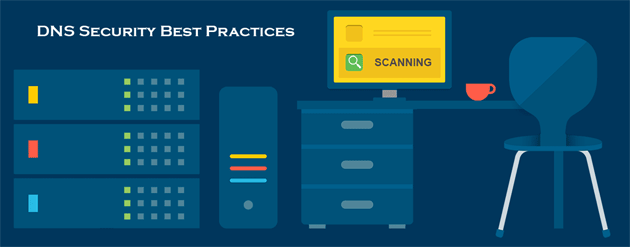Most internet applications run based on DNS then it may be emails, website browsing, messengers, etc. But very few detect the presence of this extensively used service. And this is why server administrators ignore DNS service vulnerabilities, making it easy for hackers to exploit them.
Usually, securing a server involves server software plus application software security, file system security, and physical and network security.
Below are steps to secure your DNS server –
Secure Your Server Information
Every server software has a defined version number. It’s quite easy for the attackers to identify the DNS server version from simple DNS lookup information. Detect the vulnerabilities and attack the server.
If the software version information hidden. The hacker would need to struggle to find it and attack the DNS server. This would surely make the attack impossible, preventing the DNS server.
Restrict Limitation on Recursive Queries
A DNS server handling the recursive queries forwards the DNS queries to another DNS server in case there aren’t any records available. Excessive recursive queries can hamper the memory of your server.
Queries accepted from all by an open DNS server and those even contain malicious users that query the server. DOS attacks and Cache poisoning are the results of accepting such queries.
Network traffic is possible to restrict if too many requests sent to the DNS server, further making it unresponsive. Cache poisoning involves sending specific queries to the DNS server and controlling server traffic forcefully by attackers.
When a closed DNS server is configured. Recursive queries limited as the server accepts queries only from trusted clients. Restricting the client numbers served concurrently by the DNS server or turning off recursive queries also be done.
Run the server as a non-privileged user
If the DNS server is run as a privileged user like root. The attackers gaining access to it can easily track other processes too by misusing the privileges of the super-user account.
To avoid misuse, administrators usually run the DNS server as a non-privileged user. Even if a hacker compromises the DNS server, they will only gain access to DNS processes and won’t be able to infiltrate other services.
Limit Zone Transfers
It is possible to transfer the DNS zones from the DNS server to other hosts by default. But this practice considered to be highly insecure as it renders the zones public as well as vulnerable to attacks by hackers.
Therefore, administrators should limit DNS zone transfers to trusted slave DNS servers and prevent all other hosts from performing bulk transfers.
DNS Security Extensions (DNSSEC) Need to be Used
If an attacker takes over the DNS lookup process, they can redirect user traffic to their malicious site, potentially stealing confidential information or displaying fraudulent results. To avoid such attacks, administrators should use DNSSEC technology.
DNSSEC technology assures DNS data validity by digitally signing it. Third-party signing authorities, such as ICANN, validate DNS zones to help users confirm their validity.
For the confirmation that users are connecting to the right DNS server and preventing DNS Spoofing, DNSSEC security extension deployment is essential.
Keep Your Server Always Updated
If any outdated software is running on your server, it is vulnerable to attacks. For example, versions 4 and 8 of the BIND DNS software are highly insecure and prone to attacks. This indicates that you should always keep your software updated.
Server administrators need to find and install new software versions that offer better security compared to previous ones to ward off attackers. Subscribing to software security updates and other security mailing lists will help administrators receive prompt updates.
Conclusion
Every month thousands of servers hacked or attacked due to software vulnerabilities. But if you protect your DNS server with these six practices mentioned here, the server will be strong enough to prevent any attacks.
